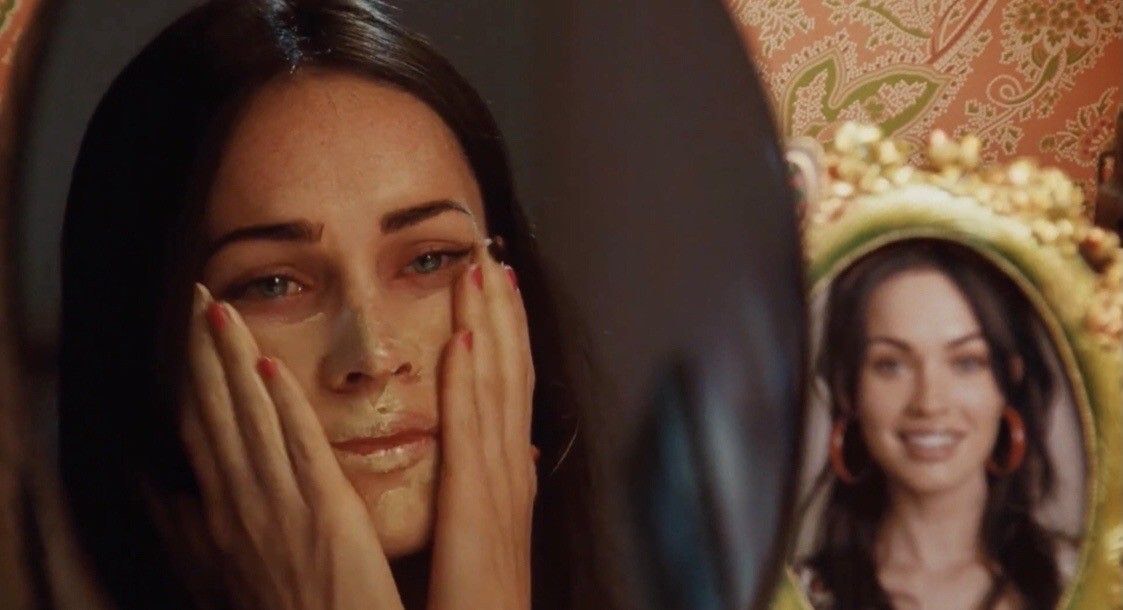 Back to selection
Back to selection
Girlblogging: Jennifer’s Body
 Jennifer's Body
Jennifer's Body As a girl—I mean, when I was younger—I would watch films about beautiful girls in the hope that I could somehow learn beauty, the fairytale story; that, by proximity, beauty would rub off on me; that I could contour myself in its image, or put it on. I was irrevocably convinced that beauty would save my life.
Beautiful girls live life on easy mode. People give you whatever you want when you’re a beautiful girl. This is sort of true, but nothing in life is free. In return, what they demand is you.
Jennifer’s Body is a film about best friends, BFFs with matching necklaces to prove it: Jennifer Check (Megan Fox, token beautiful girl of the 2010s) and Anita “Needy” Lesnicki (Amanda Seyfried, made down into Jennifer’s awkward sidekick). It is also a film about beauty: its privileges, its torments, its hierarchy. At the top of the pyramid perches the eponymous Jennifer, who is the universal object of desire.
The easy joke is embedded in the title—it’s Jennifer’s body that everyone loves; Jennifer’s body that, in 2009, was the film’s biggest selling point; Jennifer’s body that moves through three-quarters of the film after Jennifer, the human girl, is sacrificed in a satanic ritual. Here, she is doubled, or replaced—real Jennifer is gone, tied up and stabbed to death by an indie band trying to run a Faustian get-big-quick scheme, supernaturally switched out for a bloodthirsty succubus wearing her skin.
Even before she gets kidnapped, killed and possessed, Jennifer is a pretty bad friend—she’s dismissive, competitive, controlling. Beauty lends a Young-Girl a certain kind of power, but it’s always, obviously, a loan; braided with a painful awareness of its own subjective nature, its temporality, it totes along its attendant insecurities, which easily harden into cruelties. This is the beauty of girlhood, of high school dances and college parties: you are only beautiful by comparison. You are entered in a horse race, placed in a line-up. Just girly things: if you haven’t had a toxic BFF, you’ve been one.
Of course Needy becomes secondary. Even Jennifer is subordinate to her own image.
We don’t see Jennifer getting ready in the first twenty minutes of the film; she just appears on the screen, immediately beautiful. After her possession, she is forced to preserve her beauty (directly equivalent with her vitality, her literal life force) by eviscerating boys, eating their souls. Beauty is high-maintenance.
Jennifer indiscriminately smears foundation over her face, which—we are directed to believe by the tears in her eyes, by their sunken hollows—pales in comparison to its former glory. Now that she is no longer a beautiful girl, effortlessly so, her grooming rituals are desperate, abject. They remind us—and her—that, despite her new boy-killing capabilities, she’s just a shadow of the girl she used to be.
To make yourself up is to create yourself; to adorn yourself with a face, a figure. The camera implies that Jennifer (possessed) putting makeup on will never be as beautiful as Jennifer (alive), whose memory looms over her from its place on the dresser, smiling in miniature, with glossy skin and lips and hair. The brutal economy of beauty—in its performance, the beauty-relation, it takes as much as it gives. Textbook toxic friend.
No one really tells you this when you’re a girl, though. You just think beauty will save your life. For the girlbloggers who worship Jennifer, the film constitutes an impossible revenge fantasy: a manifestation of the violence girls do upon themselves—upon each other—turned back at a world that demands beauty, tricks you into it, then consumes it remorselessly.
Beauty provides Jennifer with access—to boys, to booze, to the band that ruins her life—and informs her adolescent confidence, but it comes with strings attached. Though she wields it like a weapon, the blade cuts both ways. She is desired—just desired, never feared (until her demonic fangs emerge), never loved (except by Needy), never respected. She doesn’t seem to have any friends, just admirers and targets and ex-flings. So what if she can seduce anyone? So what if she gets free shots at the local bar?
Jennifer’s bravado—the adornment, the false surface, the flawless portrait—belies her suffering, her loneliness, her single-minded attachment to Needy (who has a boyfriend), the bare face in the mirror: the one she’s trying to conceal. When the BFFs finally, inevitably come to blows, Needy strikes at Jennifer’s mortal weakness—her insecurity, her futile attempts to disguise it. How could she ever be insecure? She was the Snowflake Queen.
It doesn’t matter how many crowns you win, how many boys you eat. In images, boxed and packaged for comparison and consumption. beautiful girls are definitionally insecure. The dual engines of competition and commodification breed vicious self-criticism; vanity, the other side of the coin, breeds violent self-obsession.
In this story, everyone loses. Like they say—beauty is pain.
